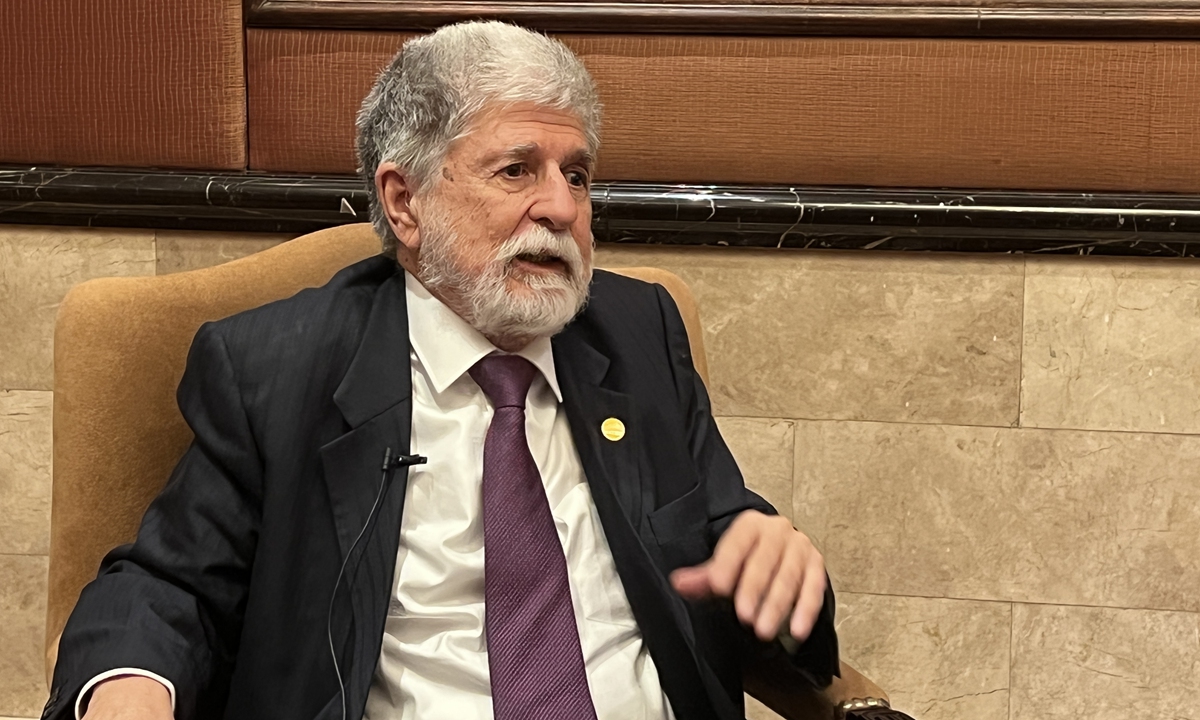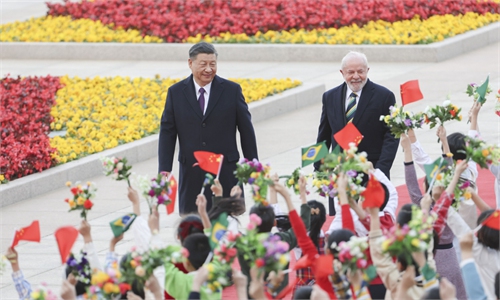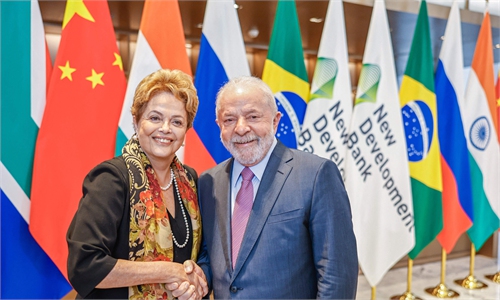Exclusive with top adviser to Lula: Brazil, China can play important role in building more multipolar world

Celso Amorim, a top adviser to Brazilian President Lula Photo: Zhang Yashu/GT
Brazil and China have reached many outcomes during President Lula's visit to China and the two sides had meetings of a very broad agenda. The two countries can play an important role in building a more multipolar world, in which power is less centralized and there is no hegemony, Celso Amorim, a top foreign policy adviser to Brazilian President Luiz Inacio Lula da Silva, told the Global Times in an exclusive interview on Friday.
When comparing this visit to the previous visit that President Lula made to the US, Amorim said that the visit to the US was strictly political and the discussion was not as broad as in this visit to China.
Brazilian President Lula paid a state visit to China from April 12 to 15. Chinese President Xi Jinping held talks with him at the Great Hall of the People in Beijing on Friday.
Xi pointed out that China and Brazil are the two biggest developing countries and emerging markets in the Eastern and Western hemispheres. As comprehensive strategic partners, China and Brazil share extensive common interests. The overarching, strategic and global influence of the China-Brazil relations continues to grow.
China always views and develops relations with Brazil from a strategic and long-term perspective, and sees the relationship as a high priority on its diplomatic agenda, Xi said.
In the exclusive interview with the Global Times, Amorim, also Brazil's former Foreign and Defense Minister, noted that this state visit is very important. It is the first visit President Lula made outside American continent after assuming office, and it's only the third month of [the new] government when President Lula already came to China with a big delegation. "Brazil and China are coming closer together," he said.
Amorim told the Global Times that Brazil is open to studying the prospect of joining the Belt and Road Initiative (BRI). He said that in reality, the BRI is already developing in the bilateral relations as the first cooperation between the two countries in the satellite area was carried out much earlier.
As for the cooperation between the two countries in the semiconductor industry which has drawn widespread attention as the US is pressing its allies to abandon Huawei equipment and discourage association with China in this area, the senior Brazilian diplomat told the Global Times that "I can quote from one of your leaders: We don't care whether the cat is white or black, provided it catches mice. Technology has no ideological tendencies, it's just a means."
He said that they will always seek the best offer and the one that is more economically affordable and that can respond to their needs.
"[Cooperating with Huawei] will be a possibility, but it will be studied technically and economically. And that's what we decided. There's no ideological or even geopolitical [consideration]. Actually, if we can diversify our sources of technology, it would be the best thing for us. So we are very open. We already have cooperation. Huawei is already present in Brazil, and it's already very important," he said.
China and Brazil have struck a deal to trade in their own currencies instead of using the US dollar. Brazil is also thinking of the possibility of creating a common currency for the BRICS and the southern common market.
During the interview, Amorim addressed the prospect of reducing the reliance on the US dollar.
"I think it's natural that we can do our own trade in our own currencies and this requires some adaptations in relation to the rules of the IMF. It's only natural because the dollar has become dominant after WWII; before it was the English pound.
"So now, if we can work with a basket of currencies and use our own currencies to a large extent, that's the best thing. Whether that can evolve to a common currency for the BRICS, or if we still keep our national currency is something that's not yet totally clear. But I think it's very important that we are free from the dominance of one single currency, because sometimes it is used politically," Amorim said.
He gave an example that if they want to have a transaction with a country that's under unilateral sanctions, sometimes they cannot do that because the transaction, for instance, might be in US dollars. They had problems like that in the past with Iran. They just sold things like poultry or meat, but still had problems in having the trade.
On Thursday, Wang Yi, director of the Office of the Foreign Affairs Commission of the Communist Party of China (CPC) Central Committee, met with Amorim.
Wang, also a member of the Political Bureau of the CPC Central Committee, noted that President Lula's visit is a milestone in the history of China-Brazil relations. He said that the strategic meeting between the two countries' leaders will have a bearing on the world and draw a new blueprint for the development of bilateral relations.
Amorim said that developing countries must cooperate more closely than ever before. Brazil is willing to strengthen strategic cooperation with China, he said, adding that he believes that Lula's visit will elevate Brazil-China relations to a new level.
Before the state visit to China, Lula flew to Washington in February for a two-day visit to the US.
Amorim said the visits to the US and China are both very important. "But the visit to the US was strictly political. There was not much discussion, maybe a little bit on the environment, but the discussion was not as broad as in this visit here," he said.
In the international politics, he said they may have many different views from the US. But "we have to recognize that the US played a positive role by rejecting an attempted coup that happened in Brazil just after President Lula was elected."
He also noted that the visit to China is an expansion of the already existing strategic partnership with China.
"China is our most important trading partner by far. Brazil is becoming one of the places in which China invests more. But not only that, I think the two countries can also have an important role in building a more multipolar world, in which power is less centralized and there is no hegemony. I think this is a very important aspect in which China and Brazil can play important roles," he told the Global Times.



